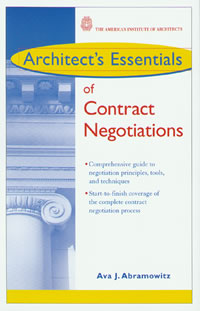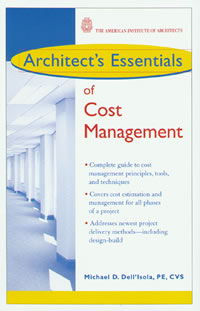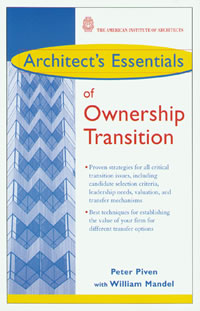
Architect's Essentials is a newly launched series of affordable handbooks on the business aspects of professional practice. "Created especially for architects and design professionals," publisher John Wiley & Sons claims. The series is being developed in partnership with the AIA. One might argue that the principles in the first three offerings—on negotiation, cost management, and ownership transition—are applicable to any firm of professionals.
What makes them particular to design professionals, though, is that their authors—a lawyer who is an honorary AIA member, an engineer, and a fellow of the AIA with a lawyer, respectively—have scores of years of experience working with architects and architecture firms large and small. Examples (and these books are chockablock full of examples) come from firms providing facility-related services. The sensitivity to client demands and market positioning will be intimately, sometimes painfully familiar to architects and engineers in practice.
Despite what many firm principals say when they utter the self-accusatory, "I should have learned that in school," the lessons in these books probably translate more aptly for people who have been in practice for a while. Nonetheless, even Art Gensler, FAIA, says it in his introduction to Ava Abramowitz's book: "I truly wish I had had an opportunity to read The Architect's Essentials of Contract Negotiation years ago. It would certainly have assisted me as I negotiated the thousands of contracts with which I've been involved."
One characteristic one notices quickly from the first offering in this series is diverse variation in the presentation of information. Where the contract negotiation guide is like a friendly conversation with a helpful (albeit occasionally hard-edged) friend, ownership transition is a get-your-pencil-out workbook—more of a several-days' visit with your business consultant. And the cost-management book, even at only 300 pages, has the feel of a tome—the most textbook-like of the three so far. (And watch for an Architect's Essentials on presentation skills coming soon. Those familiar with the draft text are calling it a real page-turner.)
 Architect's
Essentials of Contract Negotiation
Architect's
Essentials of Contract Negotiation
by Ava J. Abramowitz, Hon. AIA.
An attorney who has worked with the AIA General Counsel's office and Victor O. Schinnerer & Co., and is now in private practice, Ava Abramowitz has long advised architects not to avoid risk, but to manage it. "Contract negotiation, when done well," she writes, "is merely a memorialization of a problem-solving process, not a tug-of-war over words." The book moves the reader incrementally through understanding the importance of up-front negotiation (front-end alignment, she calls it), the purpose of contracts, and the skills one might master to bring an agreement together. Conversational in tone, with anecdotal recollections ranging from clients to her young niece, Abramowitz brings home the point that everyone has learned to negotiate as a life skill—some just haven't yet refined the art.
 Architect's
Essentials of Cost Management
Architect's
Essentials of Cost Management
by Michael D. Dell'Isola, PE, CVS
Michael Dell'Isola is senior vice president of Hanscomb, Inc., Alexandria, Va. In this book, he explains cost management in terms understandable to architects—who must deal with costs during design conceptualization, when a lot of the detail that ultimately drives cost is still missing. Starting with a discussion of building economics—the principles and factors that influence building costs—Dell'Isola moves through a comprehensive overview of the many ways there are to estimate costs, including when to use each based on project complexity, innovation, and levels of desired risk management. In his last section, "Cost Management Methodology," he brings these concepts into the framework of practice, explaining how this knowledge is applied both in design and during construction.
 Architect's
Essentials of Ownership Transition
Architect's
Essentials of Ownership Transition
by Peter Piven, FAIA, and William Mandel, Esq.
A principal consultant with the Coxe Group, Peter Piven has been showing firm principals how to position themselves competitively for decades. Here he teams with lawyer William Mandel, whose practice specializes in mergers and acquisitions for design professionals, to give the hard facts behind a somewhat soft science. There are many psychological factors as well as dollar-based valuation involved in finding the right people in whom to entrust the future of a design firm. The mechanisms for creating partnerships and moving ownership to new partners are varied and sometimes complex. This book explains what methods work best for particular situations and details hows and whens of getting it all done. The margins of the ownership transition essentials are peppered with tips, checklists, and explanations to make this a true how-to practice tool.
Copyright 2002 The American Institute of Architects. All rights reserved.
![]()
| New
In the AIA Bookstore: The
Architect's Essentials of Professional Practice Series, the
only series of business books created especially for architects
and design professionals. Developed by John Wiley & Sons, in
partnership with the AIA, the first three books in the series deal
with: |
|